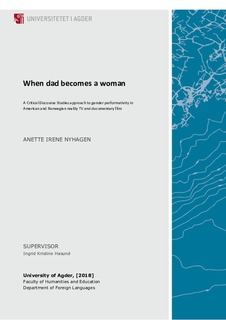| dc.description.abstract | In this master's thesis I have wanted to say something about male-to-female transgender identity construction and the way in which it takes place in ordinary life. I have investigated how two different families negotiate the feminine gender identity of their father, and how these MTF informants 'do' gender. The conversations I have analyzed come from the Norwegian documentary film All about my father (2002), and two episodes each from the American reality TV series Keeping up with the Kardashians (2015) and I am Cait (2015). Documentary film provides research material that resembles authentic speech and constributes to the construction of linguistic reality. The aim and scope has been to perform a qualitative case study.
I have taken a Critical Discourse Analysis approach that includes several theories and methods that make up an interdisciplinary approach. Judith Butler's theory of performativity and social constructionist theories about gender has made up the theoretical gender studies framework. The main research method has been Membership Categorization Analysis, combined with the 'identities in interaction'-model and theories about pronouns and naming.
The vantage point has been conversations concerned with gender transistions and the feminine part of the transgender father's identity. I have investigated how the informants construct themselves, and how they are constructed by others through membership categories, in particular those related to the MCDs 'family' and 'gender', and through pronouns and names. Where relevant, stance and stylistic features come into consideration.
I have found that the membership category 'dad' seems to be a difficult category for MTF transsexuals, especially when it comes to 'passing' as female. Both informants authenticate, and express positive stances towards, the category, but its use involves challenges in terms of MCD 'family' membership and one's gender identity. While the informants 'do' gender through their linguistic choices, they also attest to having a gendered 'core' or soul, which is contradictory to Butler's argument that the soul is culturally inscribed on the body. I have also found that the families express ambivalence towards the transition, and that there seems to be more resistance towars the membership category 'woman' than 'transgender', although there is a bit more resistante towards the latter in the American family. Finally, my findings show that while the American informant takes control of her gender performance through the use of feminine name and pronouns, the Norwegian informant seems to be more dependent on the context. | nb_NO |

